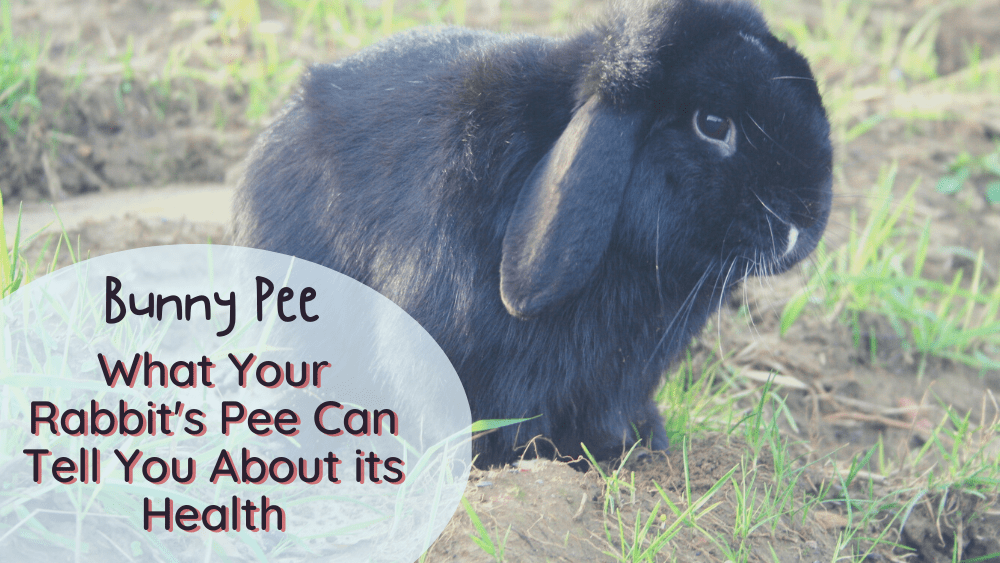Did you know that your rabbit’s urine can hold key information about its health? From its color and consistency to its odor, your bunny’s bathroom habits can give you a glimpse into its overall health and well-being. Ignoring the signs can lead to serious health issues, but by paying attention and knowing what to look for, you can ensure your rabbit stays happy and healthy.
If you recently acquired a pet rabbit, you are probably keeping a close eye on it, to make sure your bunny is in optimum health. But what should you do if you notice red pee, colorless pee, or blood in the urine? And what is normal pee and what is not?
This article will help you learn about rabbit urine, what is normal, what isn’t, what to do, and what causes a range of different types of bunny pee. We will discuss:
- The signs of unhealthy rabbit urine
- What normal rabbit urine looks like
- How to monitor rabbit urine
- How often do rabbits pee
- When to seek a veterinarian’s help
Signs of Unhealthy Rabbit Urine
A rabbit’s urine changes color depending on the diet and hydration; these color changes typically last 2–3 days. However, call a veterinarian if you notice the pee is cloudy, thick brown, pink, or bloody. Bloody urine could result from kidney or bladder disorders, while chalky urine could mean your rabbit has excess calcium.
What a Rabbit’s Normal Urine Looks Like
Before we start learning to use rabbit pee as an indicator of their health, we need to know about normal rabbit urine: its color, consistency, and odor.
Colorless or yellow pee
Your bunny’s pee should ideally be pale yellow or clear, as this indicates that your rabbit is eating and drinking well. Colorless pee shows that your rabbit is well-hydrated and healthy.
Red urine in rabbits
Your pet bunny can sometimes pass red urine, which may cause worry for most rabbit owners! But before you panic and call the vet, you should realize that red urine can be related to diet and is rarely related to blood.
When you feed your bunny vegetables such as broccoli, cabbage, dandelions, carrots, and spinach, you will notice the urine becomes red. These veggies contain beta-carotene and other brightly-colored molecules, which pass out through the kidneys and cause a change in the color of a rabbit’s urine.
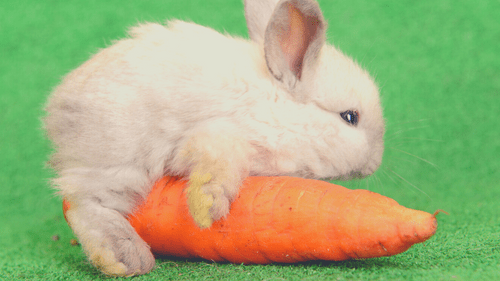
These plant pigments are not harmful to rabbits, but can temporarily color their urine red or dark yellow; the color will usually last for around 2–3 days, or up to a week.
How often do healthy rabbits pee?
A normal rabbit pees between two to eight times a day. The amount varies a lot depending on their fluid intake, with a urine production of between 120 ml a day and 650 ml a day for a rabbit weighing 5 kg (11 pounds).
Consistency
Normal rabbit pee should be clear rather than cloudy. Put the urine sample in a test tube, place it on a printed page, and try to read the print. If you can’t read a thing, that’s cloudy urine.
If you notice that the urine is cloudy, it could be the presence of urine calcium carbonate crystals, which are a normal part of your rabbit’s urine. They are comprised of three calcium crystals: anhydrous calcium carbonate, ammonium magnesium phosphate, and calcium carbonate monohydrate.
Rabbit urine is often whitish or cloudy because, unlike other pets like dogs and cats, rabbits absorb all calcium within their diet and pee the excess. So if you see white deposits in your pet rabbits’ litter box, it’s probably because of calcium crystals from your rabbit’s urine.
Healthy rabbit urine should also be free from blood, mucus, and sandy deposits.
Odor
Although healthy rabbits’ urine shouldn’t smell too much, their urine may still have a strong odor due to the high concentration of ammonia, urea, and other natural and normal chemical compounds. If your rabbit is unneutered/unspayed, it will have stronger-smelling urine than neutered/spayed bunnies. You will also notice that a buck’s urine will have a much stronger smell than a doe’s.
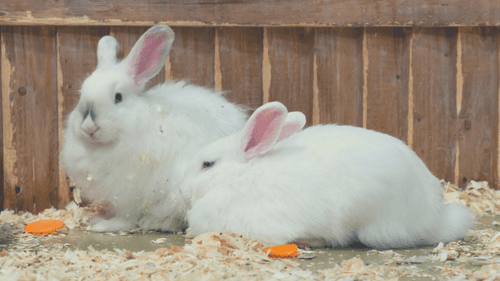
Although smelly urine doesn’t mean your bunny is ill, you should always ensure you keep the hutch clean. When you don’t clean the rabbit’s hutch, the urine is left to fester, and your bunnies could damage their nasal passages as they breathe the smell in.
How to control the strong urine odor
- Neuter/spay your rabbits, so they can pee weaker-smelling urine.
- Train your rabbit to use the litter box. Ensure the litter box is absorbent, and avoid scented litter boxes, as the rabbits tend to avoid them.
- Keep the hutch clean by removing urine-stained hay, as rabbits do not always aim well; also ensure you clean the litter box.
- Use white vinegar when cleaning the litter tray to remove traces of the odor, and any calcium residue.
Abnormal Rabbit Pee
Abnormal rabbit urine can be a cause for concern for rabbit owners.
Unexpected changes in a rabbit’s urine may indicate the presence of a urinary tract infection, kidney problems, or other underlying health issues.
You need to be aware of what constitutes normal and abnormal urine in your pet, so you can take timely and appropriate action to seek veterinary care.
Here are some common abnormal rabbit urine symptoms, what might be causing them, and what to do.
What causes amber/orange bunny urine?
Amber or orange rabbit pee can be a sign of dehydration. Dehydration causes the urine to become concentrated and change color.
What to do if your rabbit has orange pee?
If your rabbit is producing amber or orange urine, it is important to provide your rabbit with a water bowl to drink from and ensure it’s eating its greens.
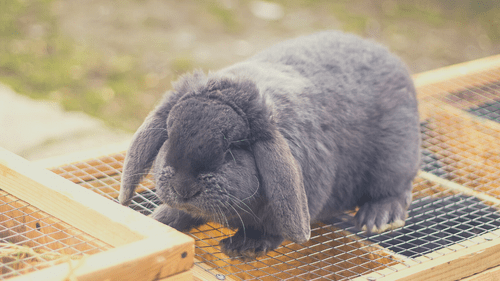
Is your rabbit peeing blood?
Although red rabbit urine might be normal and due to food pigmentation, you may need to have your rabbit examined if it is suffering from hematuria (blood in the urine). You may suspect this case, especially if your rabbit’s pee is red, yet your bunny hasn’t eaten food with high pigmentation.
Your rabbit may be peeing blood if you notice pink urine. The rabbit’s urine appears pink because the urine dilutes it. A veterinarian can take the rabbit’s urine sample using the cystocentesis procedure, where they pass a needle through the abdominal wall into the bladder to prevent contaminating the urine sample.
What happens if hematuria is confirmed?
After a microscopic examination has been conducted, and there are traces of red blood cells, your vet will need to identify the source of the bleeding and the cause.
Mostly, trauma, polyps, or failed pregnancies in unspayed female rabbits, stones/sludge in the urinary tract, cystitis, uterine adenocarcinoma, and cancer can cause hematuria.
To be sure, the vet may perform further diagnostic tests, such as a urinalysis, X-rays, or ultrasound, to determine the cause of the bleeding. Treatment will depend on the underlying cause of the hematuria.
What happens if a urinary tract infection is confirmed?
Seeing traces of blood in your rabbit’s urine can be worrying, as it may indicate that your bunny could have a urinary tract infection.
Other symptoms of UTIs in rabbits are:
- Constant urine dribbles
- Tail and legs show signs of urine scald
- Litter box trained rabbit urinates outside the litter box
- Rabbit peeing blood
- Thick sludge in the urine
- Straining to urinate but not passing anything
If a urinary tract infection (UTI) is confirmed in a pet rabbit, treatment by a veterinarian is necessary. They will prescribe antibiotics tailored to the type of bacteria causing the infection to clear the infection.
The rabbit may also require increased fluid intake and a change in diet. In some cases, the underlying cause of UTI in rabbits may need to be addressed through further testing or treatment.
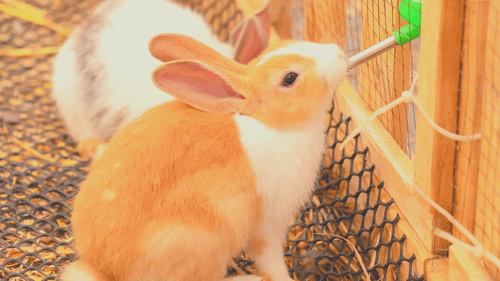
Close monitoring and follow-up with the vet are important to ensure the rabbit’s UTI is fully treated and to prevent future UTIs.
Why is my bunny’s pee cloudy?
Normal rabbit urine occasionally contains some calcium crystals, resulting in urine that can look a little cloudy, creamy, or thick.
However, if the urine is repeatedly cloudy (meaning you can’t read the newsprint through it at all) or you notice a sandy texture as well as the cloudiness, it’s worth checking with your vet in case there is excess calcium in the urine. This condition is known as calciuria.
What can cause it?
If you notice rabbit pee that is chalky or cloudy, it could be a sign your rabbit has started to develop rabbit bladder sludge. This can be because of too much calcium in your rabbit’s blood, usually related to a high-calcium diet.
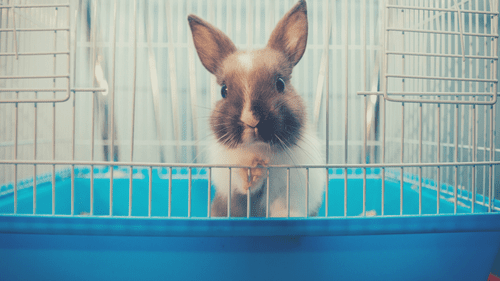
What should you do?
Left unchecked, excess calcium carbonate crystals can cause kidney stones or bladder stones. It is important to discontinue any vitamin or mineral supplements.
You should also stop giving any alfalfa, including alfalfa pellets because they contain high calcium content. Replace alfalfa with timothy or meadow hay. You should also schedule a check-up at the vet.
What about milky yellow rabbit urine?
If you notice a milky-yellow color to your rabbit’s urine, there are a few different things that could be going on. Firstly, it could be indicate calciuria, as discussed above. However, it could also be an indication of an infection in the bladder, where the urine is mixed with infected discharge or pus.
What can you do?
Because rabbits are prey species and don’t give us much indication when they are sick, we need to take subtle signs seriously. If you’re concerned there might be mucus or pus in your rabbit’s urine, take them to the vet with a urine sample.
Is Excess Urine a Sign of an Unhealthy Rabbit?
Yes, excessive urine production in rabbits can be a symptom of several underlying health issues.
Producing large amounts of urine
Rabbits are known for their low water intake and are typically able to get most of the water they need from the food they eat. Therefore, when your bunny starts producing excessive amounts of urine, it can indicate that something is disrupting their normal fluid balance.
What can cause it?
Some common causes of increased urine production include kidney disease, bladder stones or infections, hormonal imbalances, or diet-related problems such as excessive calcium intake.
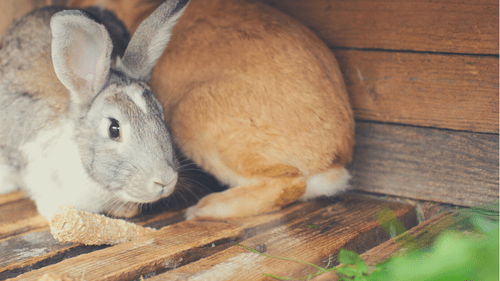
What should you do?
It’s important to have them evaluated by a veterinarian as soon as possible, as these health issues can be serious and impact the overall well-being of your pet.
Peeing frequently or in small amounts
Is your rabbit leaking urine, or have you noticed your bunny straining to go? There are several reasons for this issue.
What can cause it?
- Diet-related issues: A diet high in carbohydrates or calcium can cause frequent urination in rabbits. You should make dietary changes that will help your pet bunny to lose weight and feed them a diet containing less calcium.
- Urinary tract infection: Bacterial infections or bladder stones can cause frequent urination and discomfort.
- Hormonal imbalances: Is your bunny pregnant? If yes, overactive adrenal glands or hormonal changes during gestation can cause frequent urination.
- Kidney disease: Chronic kidney disease can cause rabbits to urinate frequently in small amounts.
- Aging: As rabbits age, their kidneys may not function as well, leading to frequent urination.
- Bladder infection: A dirty cage could cause your rabbit to get infections.
What should you do?
Since your pet rabbit should pee 2–8 times a day, it is good to keep their hutch safe, change their diet, and have a vet inspect them to rule out any diseases.
Peeing in lots of different places
Another reason for excess urination could be that your pet rabbit is marking its territory! Rabbits are territorial animals and may mark their territory by urinating in specific areas.
What can cause it?
This kind of urination is especially common in male rabbits and can occur when they are housed with other rabbits. Territorial marking can also occur when you introduce a new rabbit to a household or when you make changes to the rabbit’s environment.
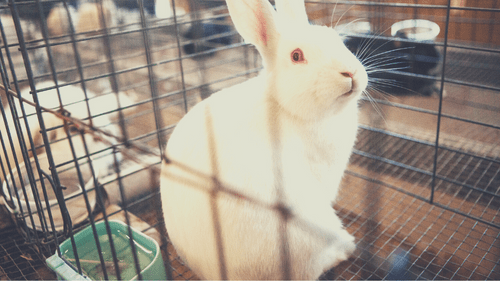
What should you do?
It is important to understand that this type of excessive urine production is different from health-related causes and may require a different approach for resolution, such as adjusting the rabbit’s environment or separating them from other rabbits.
Remember, it’s best to consult a veterinarian if you are unsure whether your rabbit’s excessive urine production is due to territorial marking or a health issue.
How to Monitor Rabbit’s Urine
If we’ve convinced you that it’s worth invading your bunny’s privacy to keep an eye on their toilet habits, here’s a step-by-step guide to monitoring your rabbit’s urine for health concerns:
- Check the rabbit’s litter box regularly for any changes in the urine’s frequency, volume, or appearance.
- Keep a journal to note any urine changes.
- Look for any signs of discomfort or pain, such as straining or licking the genital area, when urinating.
- Collect a urine sample by placing a clean, dry container in their litter box and pouring any captured urine into a clean container. Observe these samples for any changes. You can also use a dropper to suction the urine out of the container.
- Consult with a veterinarian for a proper evaluation and treatment if you observe any changes or have concerns about your rabbit’s urine.
One test you can do at home is to check for blood in rabbit urine. You can test a urine sample by pouring hydrogen peroxide in with the urine: if you see the mixture foaming, it indicates blood is present.
Is Rabbit Pee Harmful to Humans?
You may be concerned about the safety of having a rabbit around your family members and be wondering, is rabbit urine harmful to humans? Well, while the odor of rabbit urine can be strong and unpleasant, it does not pose any immediate danger to humans.
However, rabbit urine can contains the bacteria E. cuniculi, which can cause infections in humans, especially in individuals with compromised immune systems or underlying health issues.
Handling rabbit urine with care and following proper hygiene procedures is important to avoid potential health risks.
When to Seek Veterinary Help
While monitoring your rabbit’s urine, you should take your rabbit (and ideally also a urine sample) to be examined by your veterinarian if you see any of the following:
- Blood clots (red, brown, or black) or a sandy consistency.
- Bunny straining when trying to pee.
- An unusual urination pattern, such as peeing in strange places or more often than usual.
- Sudden behavioral changes such as seeming grumpy, quiet or withdrawn.
- Any urine color that you’re not certain is normal.
The vet will observe the urine and determine if there are signs of a UTI, bladder stones or thick bladder sludge in the rabbit’s urine. They will also be able to offer specific treatment and advice.
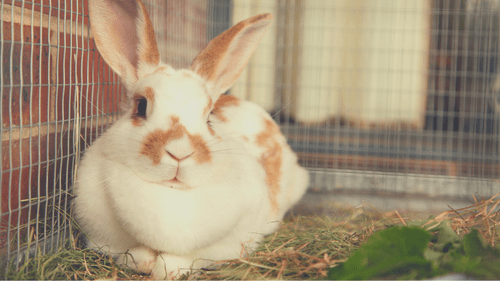
Conclusion
While it may seem like the least interesting part of pet ownership, clearing up your rabbit’s pee can give you valuable information to keep your rabbit healthy. Get familiar with the color, smell, amount, and frequency of urination that is normal for your rabbit, so that you are aware of any changes and can get them checked by a vet.
We hope you enjoyed the insights provided in this article, and we look forward to answering any questions you have. Please share or comment below if you enjoyed this article!


